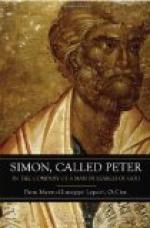“Why?”
Donovan looked at him curiously. “Oh, you’ll find out fast enough, padre,” he said. “Wonder what you’ll make of it. Rum place just now, France, I can tell you. There’s the sweepings of half the world over there, and everything’s turned upside down. Fellows are out for a spree, of course, and you can’t be hard on a chap down from the line if he goes on the bust a bit. It’s human nature, and you must allow for it; don’t you think so?”
“Human nature can be controlled,” said Peter primly.
“Can it?” retorted the other. “Even the cloth doesn’t find it too easy, apparently.”
“What do you mean?” demanded Peter, and then added: “Don’t mind telling me; I really want to know.”
Donovan knocked out his pipe, and evaded. “You’ve got to be broad-minded, padre,” he said.
“Well, I am,” said Peter. “But ...”
“Come and have a drink then,” interrupted the other. “Jenko and the Major are coming back.”
“Damned poor whisky!” said the latter, catching the rail as the boat heaved a bit, “begging your pardon, padre. Better try brandy. If the war lasts much longer there’ll be no whisky worth drinking this side. I’m off it till we get to the club at Boulogne.”
Peter and Donovan went off together. It was a new experience for Peter, but he wouldn’t have owned it. They groped their way down the saloon stairs, and through a crowd to the little bar. “What’s yours?” demanded Donovan.
“Oh, I’ll take the Major’s advice,” said Peter. “Brandy-and-soda for me.”
“Soda finished, sir,” said the bar steward.
“All right: two brandies-and-water, steward,” said Donovan, and swung a revolving seat near round for Graham. As he took it, Peter noticed the man opposite. His badge was a Maltese Cross, but he wore a flannel collar and tie. Their eyes met, but the other stared a bit stonily. For the second time, Peter wished he hadn’t a clerical collar. The next he was taking the glass from the South African. “Cheerio,” said Donovan.
“Here’s to you,” said Peter, and leaned back with an assumption of ease.
He had a strange sense of unreality. No fool and no Puritan, he had naturally, however, been little in such an atmosphere since ordination. He would have had a drink in Park Lane with the utmost ease, and he would have argued, over it, that the clergy were not nearly so out of touch with men as the papers said. But down here, in the steamer’s saloon, surrounded by officers, in an atmosphere of indifference to him and his office, he felt differently. He was aware, dimly, that for the past five years situations in which he had been had been dominated by him, and that he, as a clergyman, had been continually the centre of concern. Talk, conduct, and company had been rearranged when he came in, and it had happened so often that he had ceased to be aware of it. But now he was a mere unit, of no particular importance whatever. No one dreamed of modifying himself particularly because a clergyman was present. Peter clung to the belief that it was not altogether so, but he was sufficiently conscious of it. And he was conscious of liking it, of wanting to sink back in it as a man sinks back in an easy-chair. He felt he ought not to do so, and he made a kind of mental effort to pull himself together.




